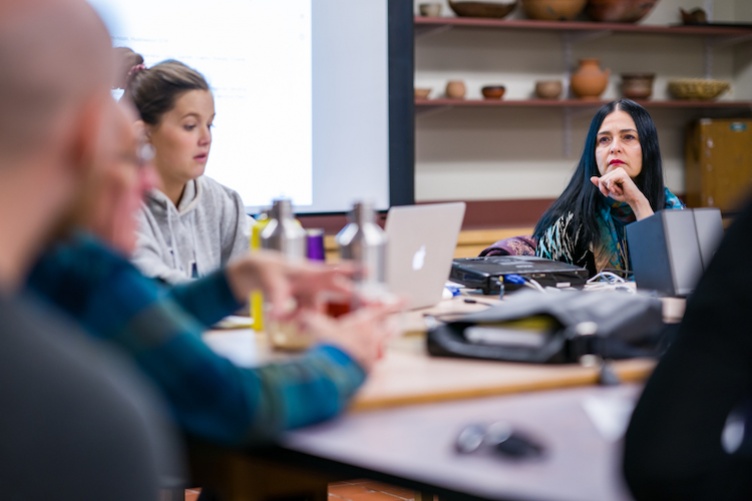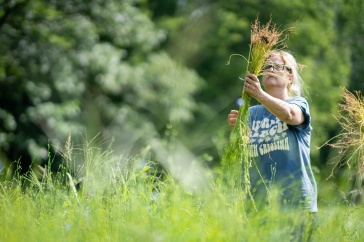
Svetlana Peshkova at an Indigenous NH Cultural Heritage Initiative meeting.
Columbus Day became a national holiday in 1937. It would be more than 50 years later — and 500 since Columbus arrived in America — before people came to officially recognize the impact the foreign explorer had on the lives of millions of Native Americans and Indigenous peoples.
Discussions about changing the name to Indigenous Peoples' Day began in 1977 at the International Conference on Discrimination Against Indigenous Populations in the Americas, held in Geneva, Switzerland. In 1990, South Dakota replaced Columbus Day with Native Americans' Day. Two years after that, Berkeley, California, was the first city to rename the holiday Indigenous Peoples' Day.
The fact that the movement continues today — that there are still states that celebrate Columbus Day — supports the need for coursework like that found in UNH’s Native American and Indigenous studies minor.
“UNH is located on the traditional lands and waterways of the Abenaki, Pennacook and Wabanaki people, past and present, who have ongoing cultural and spiritual connections to the area, including the land and waterways and their inhabitants,” says Svetlana Peshkova, associate professor of anthropology and coordinator of the Native American and Indigenous studies program. “For several years, many of our faculty members have been working on developing productive relationships with Indigenous communities in New England and the United States.”
“In the efforts to decolonize history and heritage studies, the minor offers courses that introduce students to the more nuanced history of this country,"
Peshkova cites as example the internship with the Indigenous New Hampshire Collaborative Collective, a grassroots organization that connects students with indigenous and non-indigenous members in New Hampshire and other areas.
“UNH students, faculty and community collaborators embraced this internship with passion and commitment, leading several of us to develop a long-term vision for building sustainable relations between the university and Indigenous communities,” Peshkova says. “The Native American and Indigenous Studies minor was one outcome of this collaboration.”
The course concentration strives to provide undergraduates with a broad understanding of, among other things, the history, lands, culture, literature, language and artistic expression, social organization and political statuses of Native American and Indigenous peoples within and beyond North America. Issues explored include colonialism, diaspora, social movements, politics and policy. Students also engage with numerous Indigenous scholars.
“In the efforts to decolonize history and heritage studies, the minor offers courses that introduce students to the more nuanced history of this country, past and present contributions of Indigenous peoples to this and other countries foundational principles, i.e. democracy, and recent activist, scientific and artistic contributions of Indigenous peoples to their communities,” Peshkova says. “More importantly, a value of Indigenous communities’ knowledge and stewardship of this land and waterways cannot be overestimated. Living in these precarious times of a global pandemic, increasing food insecurity, a lack of social justice and an overabundance of evidences of rapidly growing climate change, learning from and with Indigenous communities about how to adapt and negotiate human and the environmental needs become paramount.”
This past Oct. 12, for the very first time, Indigenous Peoples' Day was celebrated at UNH.
“While we acknowledge the harmful effects of colonialism on Indigenous communities, this day allows us to formally reflect on and celebrate Indigenous cultures and histories,” Peshkova says. “It demonstrates UNH’s commitment to including Indigenous perspectives and community engagement that extends UNH’s diversity initiatives.”
-
Written By:
Jody Record ’95 | Communications and Public Affairs | jody.record@unh.edu
















































